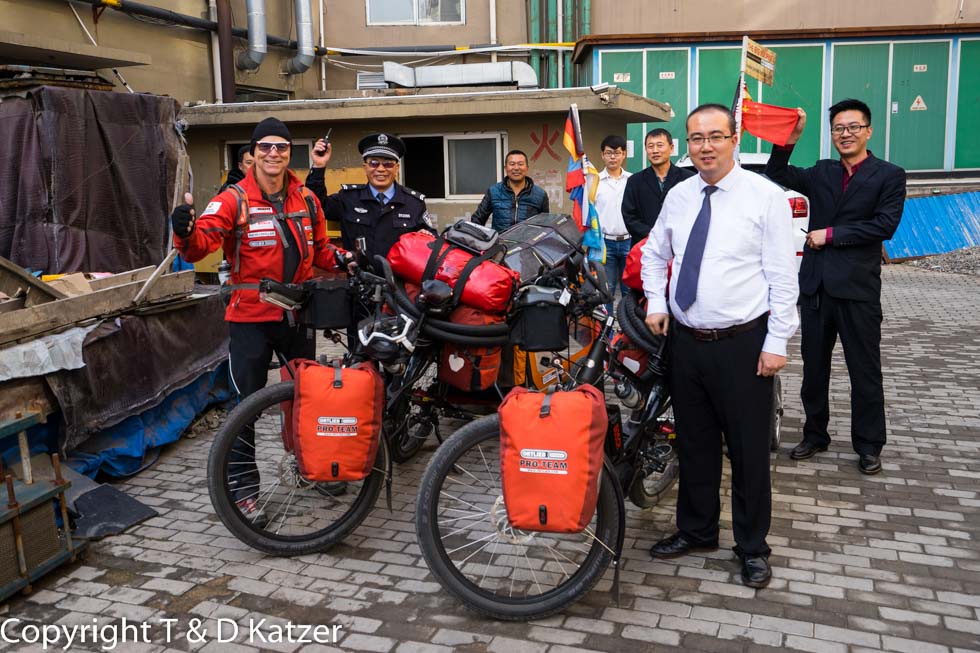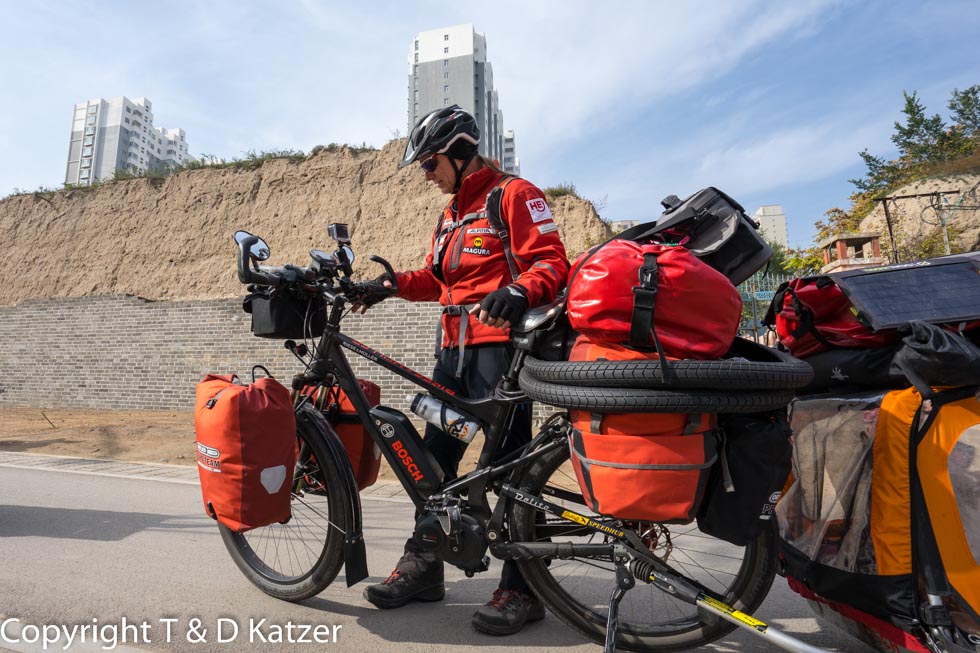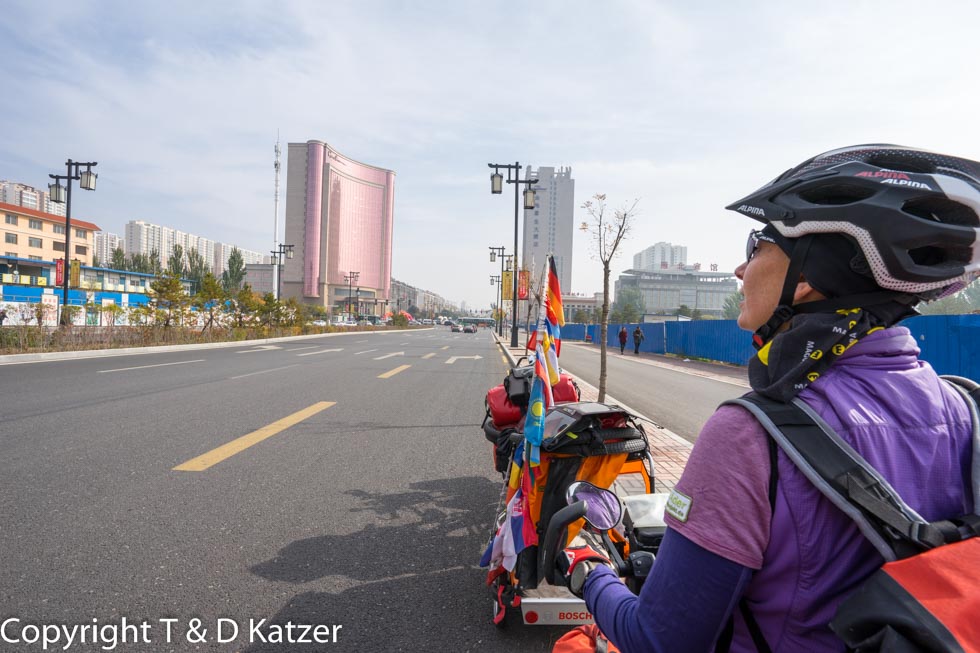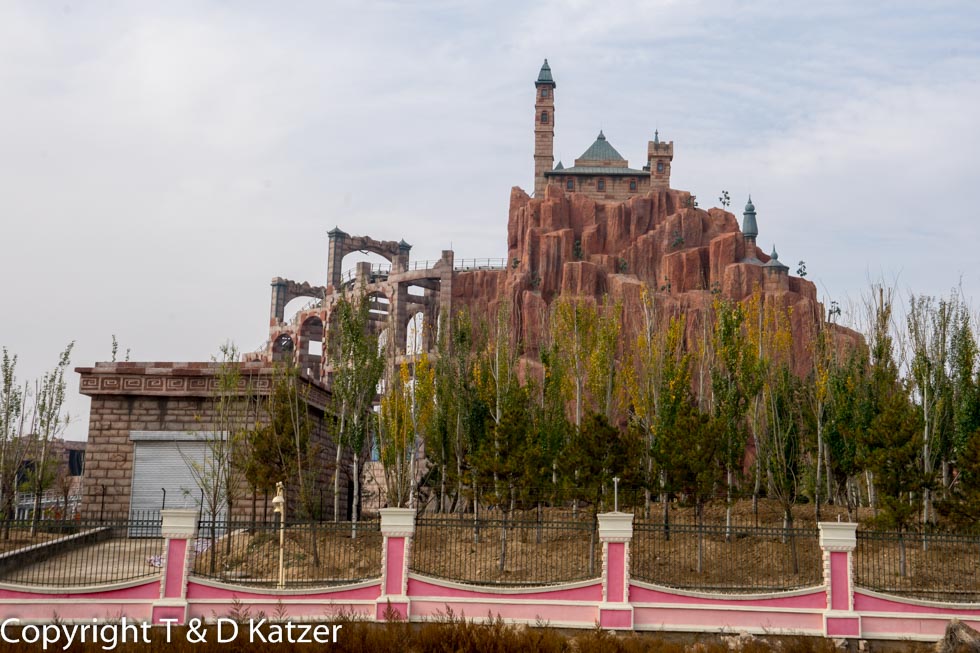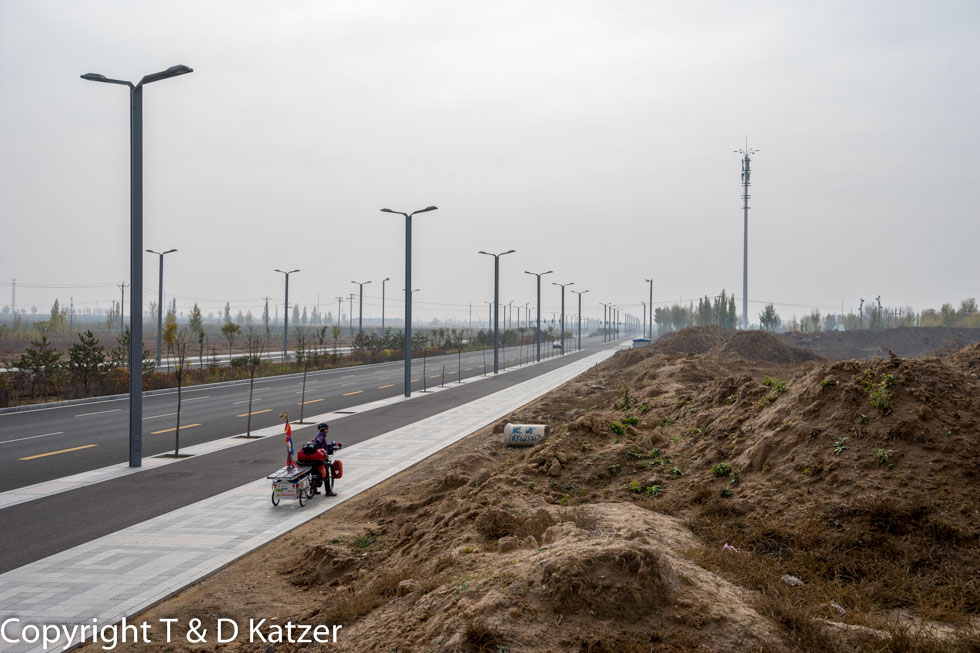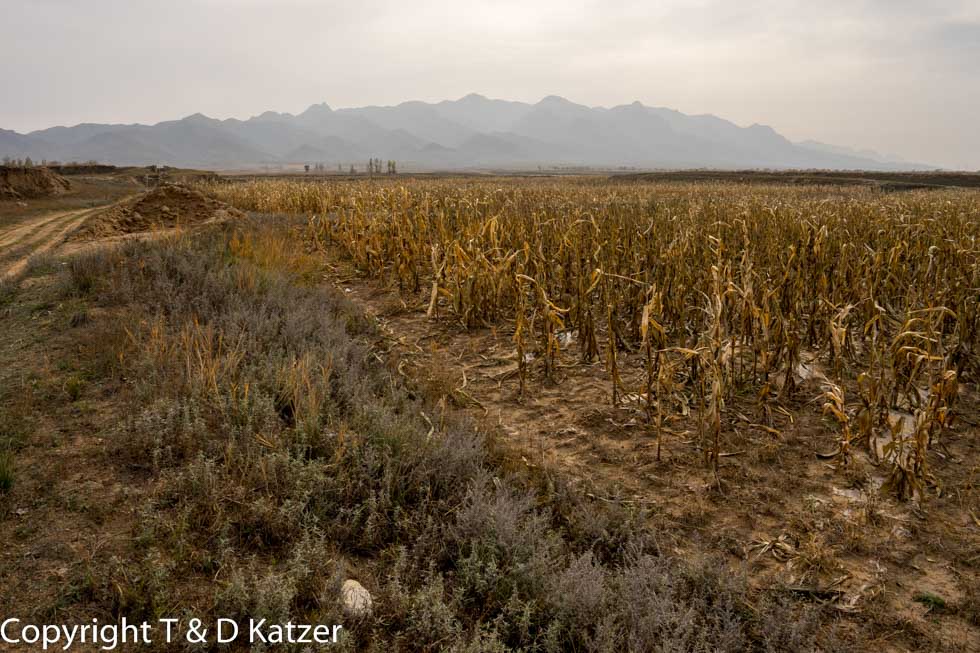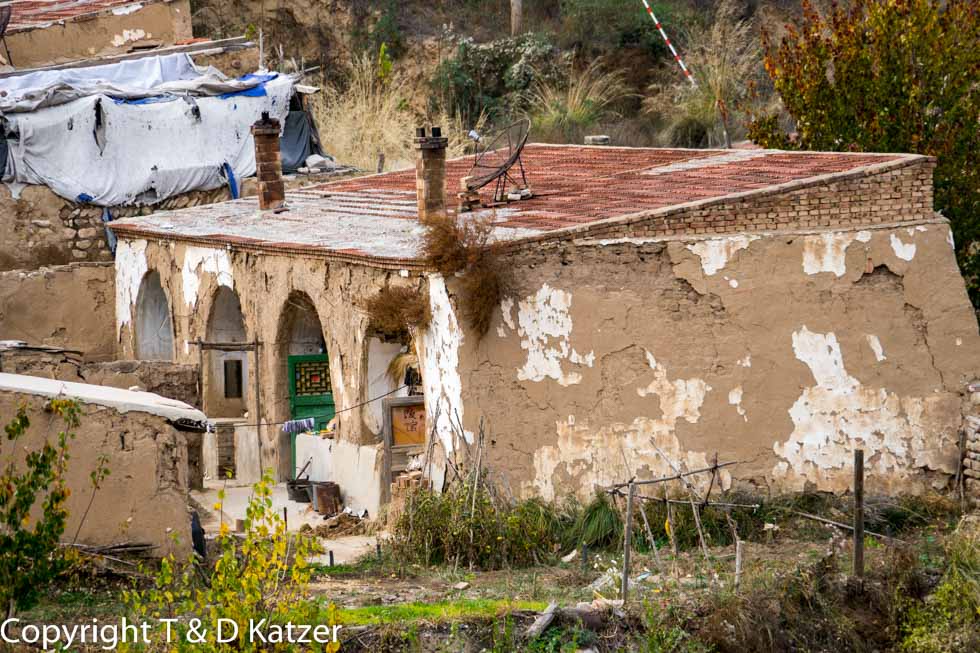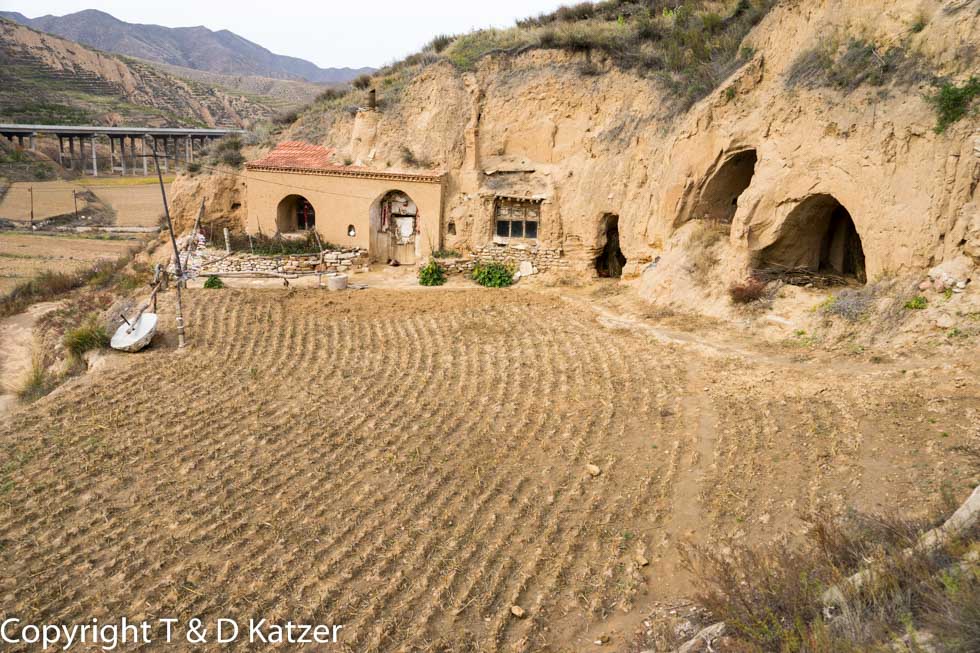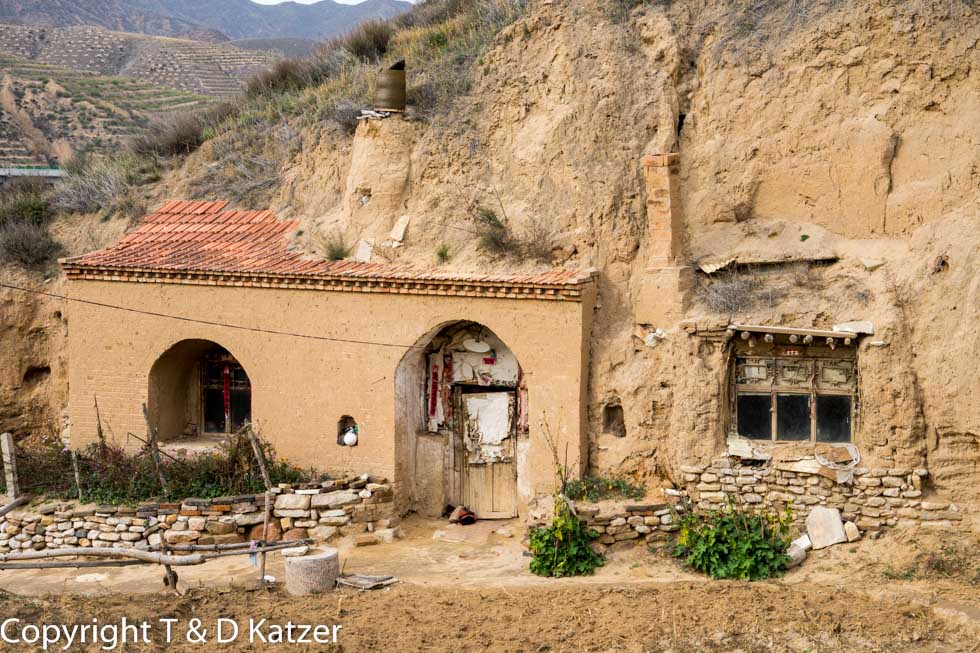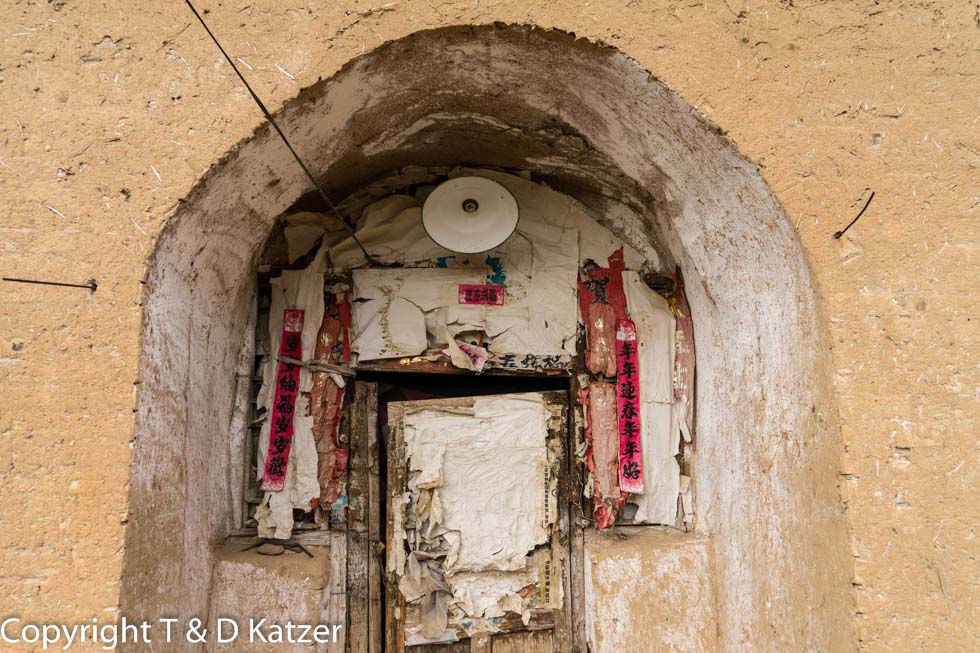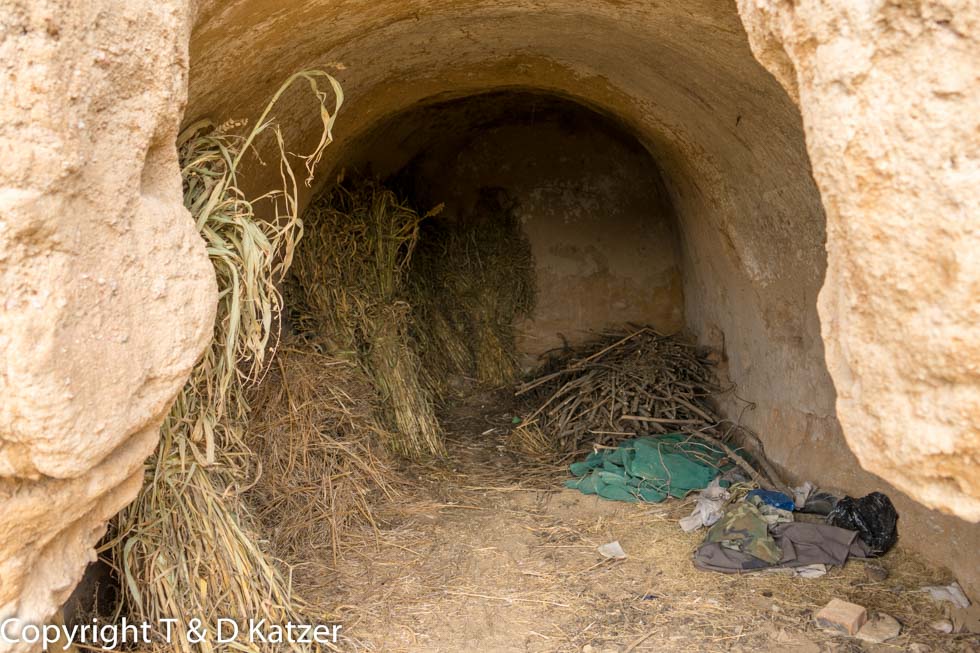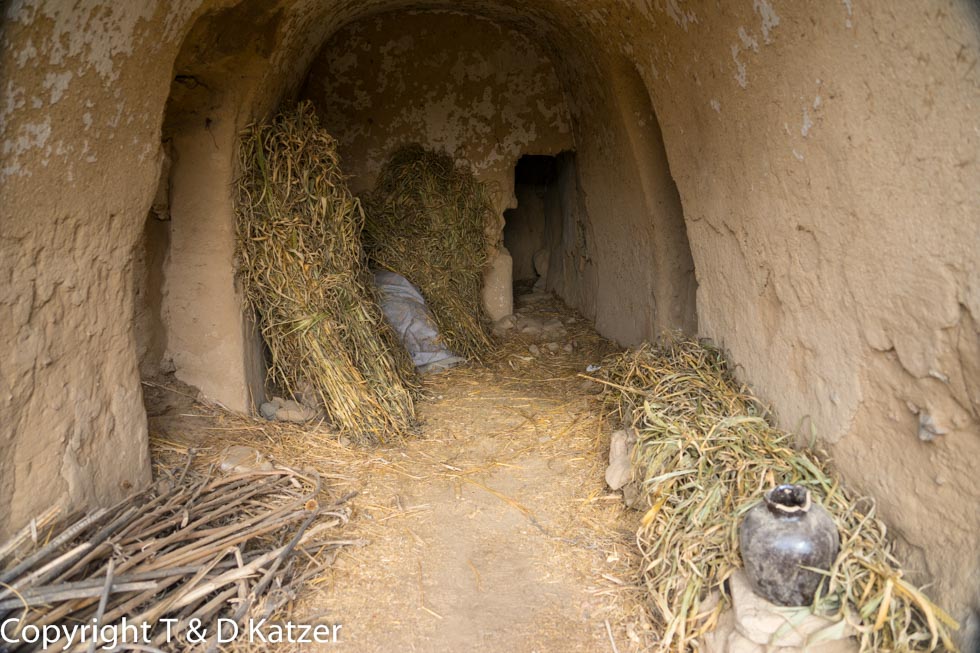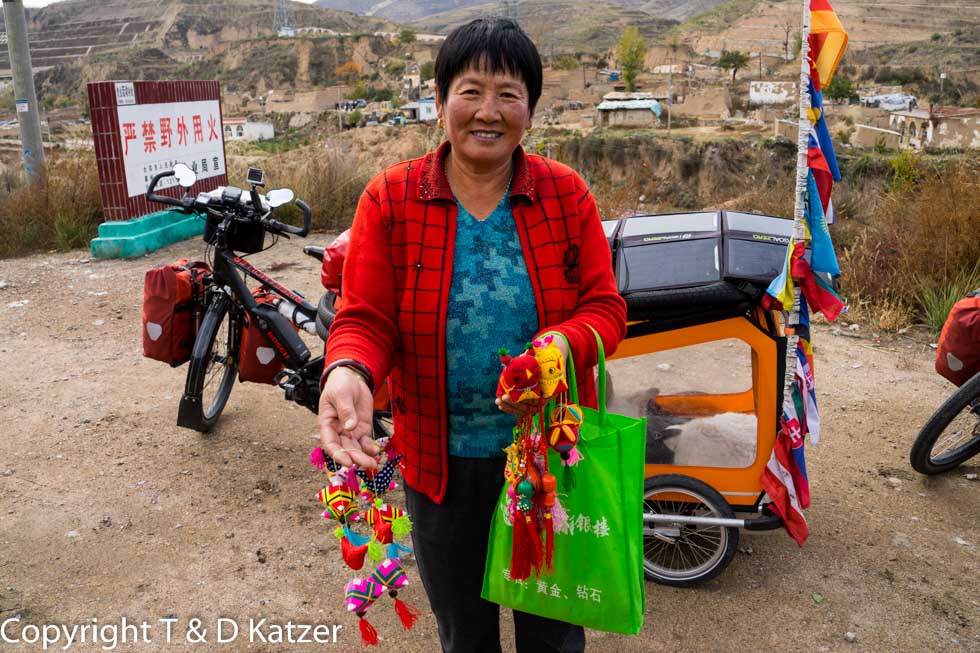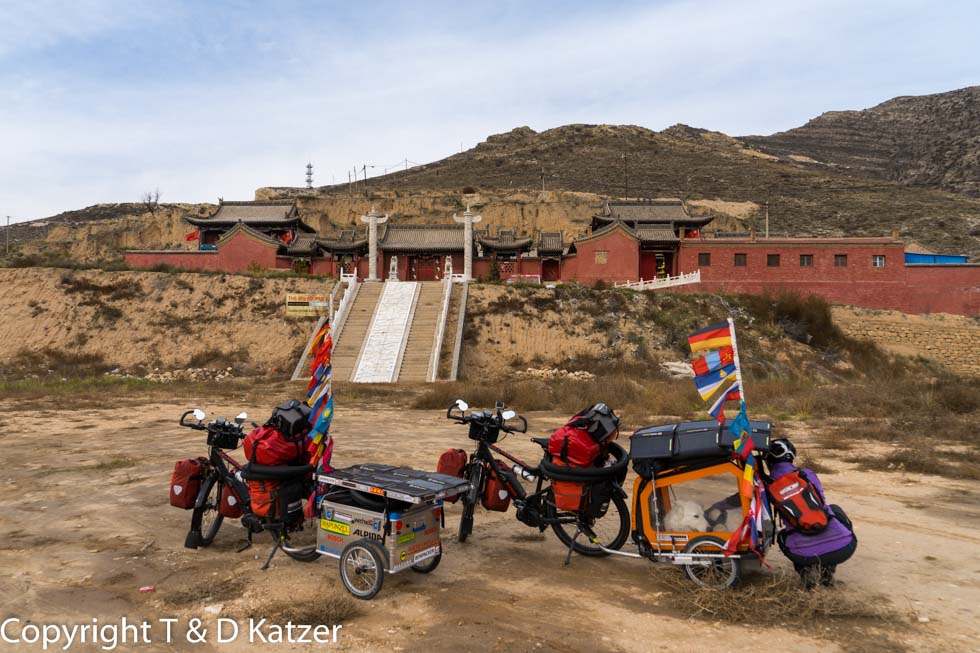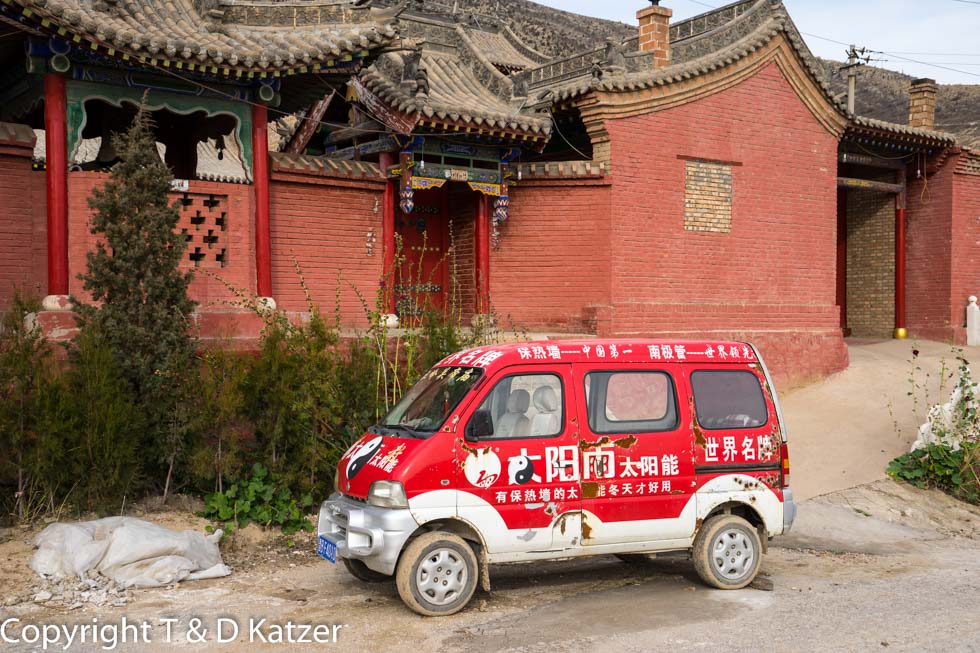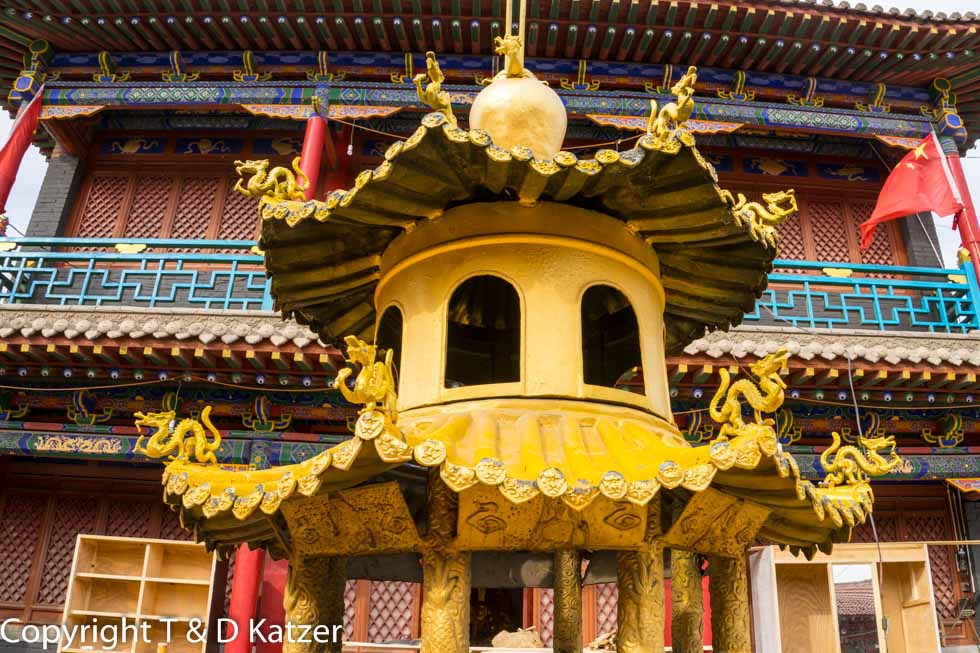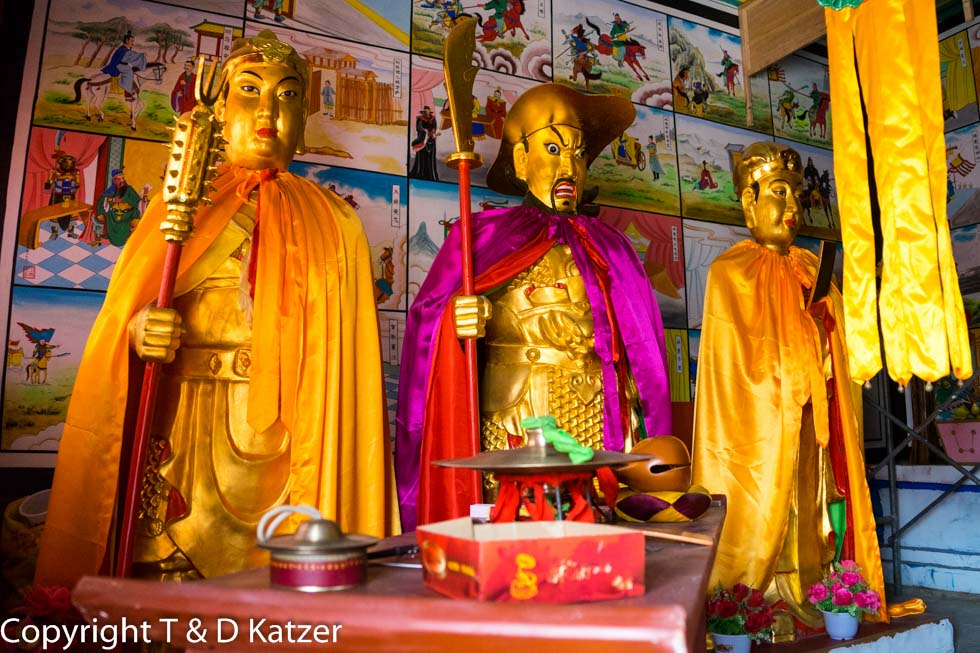
Cave dwellings and sometimes it’s good to say no
N 39°40'47.3'' E 113°41'46.0''
Date:
24.10.2015
Day: 118
Country:
China
Province:
Shanxi
Location:
Hunyuan
Latitude N:
39°40’47.3”
Longitude E:
113°41’46.0”
Daily kilometers:
77 km
Total kilometers:
10,026 km
As the crow flies:
59 km
Average speed:
21 km/h
Maximum speed:
47 km
Travel time:
3:30 hrs.
Soil condition:
Asphalt
Maximum height:
1.288 m
Total altitude meters:
6.576 m
Altitude meters for the day:
476 m
Maximum depth:
888 m
Headwind Wind force: 5
35 Km/h
Sunrise:
06:43 am
Sunset:
5:35 pm
Temperature day max:
14 °C
Night temperature:
1 °C
Departure:
10:40 a.m.
Arrival time:
6:40 pm
Total plate tires:
8
Plate front tire:
2
Flat rear tire:
5
Plate trailer tire:
1
(Photos of the diary entry can be found at the end of the text).
Although I would have liked to stay in the hotel to write a few texts in pleasant conditions, we decided to leave. The reason is still the approaching winter. It simply makes no sense to spend the sometimes still pleasant temperatures with the records if it starts to snow in this region in a few weeks, perhaps even days, and the mercury column drops far below zero degrees. My guess is that we gain a degree with every hundred-kilometer stage to the south. That means 10 degrees at 1,000 kilometers. So if it’s minus 20 degrees in this region, it’s minus 10 degrees 1,000 km further on. With a bit of luck, we can escape the extreme cold in this way. Nevertheless, winter will be breathing down our necks for the next four months.
The general manager and his team help us carry our luggage into the backyard. Everyone present will be captured with us in individual and group photos with everything that can be photographed for friends, relatives and anyone else. The director doesn’t miss the opportunity to take a test spin on my unloaded bike. “Will that go well?” asks Tanja, observing the boss’s first wobbly meters. Just before the slightly overweight man on my classy bike crashes, he brakes with his polished shoes and comes to a halt without any damage. “Phew, that just went well.” Everyone involved laughs, especially the boss. 30 minutes later, the equipment is stowed on the eight tires. “Zaijian! Zaijian!” (Goodbye! Goodbye) shout the director, his managers and a few employees, while the security staff put their right hands to their temples to bid us farewell with a military salute. “Wow, this is getting better and better,” I say happily, returning the greeting.
We join the city traffic at 12 °C and in wonderful weather. We pass the remains of the Great Wall of China and the former old town of Datong, which was once flattened and rebuilt a few years ago in the style of the Ming dynasty at a cost of 6 billion euros, mainly for tourist-commercial reasons. To avoid the traffic, I navigate us in an easterly direction of the metropolis. A twelve-lane, endlessly long, completely empty monster road unfolds in front of us, including the wide two-wheeler and footpath. Futuristic, oversized buildings in the shape of mushrooms, pyramids and nets are being built on the left and right. A castle from the world of myths and fairy tales is built on an artificial rocky mountain. It looks like a kind of Chinese Disneyland is being created here.
The Heng Shang, which is over 2,000 meters high and 150 km long, stretches out before us. It is one of the five sacred mountains of Daoism. “It’s going to be a tough day if we have to go over there,” I say, impressed by the sight of the towering rock face. Then the first foothills appear in our path. The asphalt leads through fields, occasionally splits up historic sections of the Great Wall of China and turns into a mountain pass. To save energy, we switch from sport mode to tour mode and wind our way through the mountains from 850 meters to almost 1,300 meters. Will the time for crossing passes begin now? In laboriously constructed terraces, the local farmers use every square meter to grow wheat, millet and maize. We discover caves dug by humans in the rock faces. “Stop!” I shout. While Tanja looks after the bikes and Ajaci, I climb up to explore the rock caves. While China’s major cities are developing at breakneck speed, time has stood still here. The poverty of the rural population roars out at us in this place. Some of the caves I discover are used to store the meagre harvest that has been wrested from the land. Others of the caves still seem to be inhabited. Someone has gone to a lot of trouble to grow a few plants in front of the clay outer wall. The wooden door, gnawed by the ravages of time, is locked with a simple, rusty lock. In front of the rock dwelling is a small field that was harvested not long ago. The living past meets ultra-modern engineering technology. In the background you can see the highway, which cost billions to build, eating its way through the mountains and crossing wide valleys in gigantic bridge constructions. I find it amazing that over 30 million Chinese still live in caves today. If you think about how many people lived worldwide in the Stone Age, that’s six times as many. In the loess plateau of the two northern provinces of Shanxi and the neighboring province of Shaanxi, life in yaodongs, as the caves are called, has a tradition going back thousands of years. The loess soil in this region is perfect for digging into the inside of a mountain face. You don’t have to learn the masonry trade, be able to calculate statics or, above all, buy expensive building materials. Ideal and cheap for the destitute rural population. What’s more, a Yaodong is extremely energy-efficient. In winter it stores heat – in summer it remains pleasantly cool. This saves raw materials. It is even said that the loess earth contains many health-promoting trace elements that slow down the ageing process of human organs. When I think of the countless, ugly, mass-produced concrete dwellings in cities, there could be some truth to it. I look through the dirty window pane and discover a kind of stone bed in the dim light, the Kang, which is pleasantly cool in summer and heated by a fireplace underneath in winter. In many villages today there is electricity and sometimes even a water supply that some better-off Yaodong people use for their cave.
Below me, I catch sight of Tanja talking to a local woman. The farmer’s wife recognized us from the other side of the valley, where a village clings to the rock face, and quickly rushed over to sell a few handmade rag dolls. A way to earn a few extra yuan. Just a few kilometers further on, a Buddhist monastery shines from the mountain slopes. Although we don’t have much battery capacity left, we steer our e-bikes off the road and stop below the holy place. The monastery is currently under construction. Perhaps on the foundations of old ruined walls? Apart from us and a single craftsman, there are no other people around. In the rooms, we are greeted by the usual Buddha figures. No longer chiseled out of precious stones in months of work as in the past, but molded from today’s favorite materials, concrete or plastic. Although incense wafts through the air, the place lacks the charisma and energy of historic buildings. We don’t stay long and pedal towards the highest point of the pass. Below us lies the district of Hunyuan, which is home to around 350,000 inhabitants. The Dongfangsheng community is also located there, which is the starting point for the famous hanging monasteries of Xuangkong Si. As we don’t yet have a replacement for the old bent drawbar, I roll down into the valley with the brakes applied, as breaking them would certainly have fatal consequences.
Because we had considerable difficulties finding accommodation as foreigners with bicycles and a dog, Lois, a helpful Bosch China employee, offered to find and book accommodation for us. One reason why we are taking a particularly relaxed approach today. “Nali lüguan?” (Where is the hotel?) Tanja asks two men who are loading their three-wheeled cargo motorcycles, which were built by many European motorcycle manufacturers in the 1930s and are part of the everyday street scene here in China. The men look at the piece of paper with the address written on it in Chinese. They use sign language to point us in the right direction. “That works out great”, I am happy not to have to look for accommodation or a hotel today, only to end up not being accepted for the well-known reasons. Believing it to be easier on this cool evening, we cycle to the indicated traffic circle. “Which direction did he say?” I ask Tanja. “I think to the right.” “Do you think or do you know?” “Hm, maybe you should ask the old men on the bench there.” “Okay, I will,” I reply, put my bike on the stand and walk to the men with pumped-up thighs because of the strenuous pass crossing. “Ni hao!” (Good afternoon), I greet them in a friendly manner and show them my note. The oldest of them takes my paper and holds it about ten centimeters in front of his eyes. Then he reads every single letter very slowly, looks at me afterwards as if I wanted to suggest opening a bank account, and sends me in the direction we’ve just come from. “What does he say?” asks Tanja. “We should go back.” “Can’t be.” “No, it can’t be,” I reply and hand my note to a driver who stops in front of me to capture me on his smartphone. The man takes my little document and shouts in my ear in such a way that I have to shake myself briefly. Then he repeats himself slurring, yes slurring. You can tell even without knowing Chinese. When I want my paper back, the man behind the wheel holds it tightly and waves it around. “What’s he saying?” shouts Tanja, still standing over her bike. “He’s slurring his words!” “What?” “He’s blue,” I say and when the man is inattentive for a moment, I grab my important piece of paper. We ask another Chinese man who sends us in the direction of the city. “Sounds plausible,” I am convinced, which is why we are now driving into the city. 500 meters further on I become unsure and ask again. This time we turn back and try to follow the description in a southerly direction. “How are we supposed to find the accommodation if everyone tells us a different way?” I ask 30 minutes later, annoyed. Even though I have seriously sworn not to write about accommodation searches and their difficulties anymore, a new, previously unimagined variant has just opened up that shows how difficult it can be to find a certain place in China without speaking or understanding the language. With the last of our battery reserves, we pedal our steeds along a road that stretches up to the nearby mountain range. We keep asking local residents. Some simply shake their heads, others can’t read, many just shrug their shoulders or send us in opposite directions. Finally, a man in worn clothing who seems to know the area tells us that we have to go back. So we let our bikes roll back down the asphalt. A good 45 minutes have now passed. “Over there! That’s definitely it,” Tanja is sure, pointing to a green, narrow, ugly house, the mere sight of which makes me uncomfortable. “Nali lüguan?” (Where is the hotel?) I ask a gentleman standing in front of the house in question, smoking a cigarette. “Zheli.” (Here) “Here,” he says. “Zheli?” I ask in surprise. “Shide”, (yes) he replies. “Well, Lois has booked us a strange shed,” I say. After we have inquired about the price to be on the safe side, the unfriendly hotel owner, or whatever they call this place, wants 100 yuan. (€14.47) “But Lois spoke of 89 yuan,” (€12.88) says Tanja. “It doesn’t matter, the main thing is that we’ve found it and Ajaci can go in,” I reply. Meanwhile, another group of people gathers around us. “But the bikes are allowed in too?” I ask, to which the owner of the green house points to the courtyard, which cannot be locked at the back. We are unsure whether this establishment is really the one we booked and call Lois. Tanja hands the smartphone to the man. Since Lois certainly can’t tell at first whether we’re being taken in by a liar or not, we have little choice but to check in or continue wandering around outside. The bikes are quickly unloaded and although people from the estate are standing around us, no one helps us carry a single piece of luggage into the ugly interior. “Lock your bikes well,” a guest at the hotel warns me. Should we really stay here? I’m busy locking up our bikes with all the locks we have and pulling a tarpaulin over them when Tanja appears. “So, everything okay?” I ask, looking at the bikes with an uneasy feeling as they are standing in a courtyard accessible from the outside for the first time during the entire journey. “No, the unfriendly one suddenly doesn’t want to let Ajaci into his dump.” “Oh come on?” “I gave him a dirty look and reminded him of our agreement and booking. I think he ate that up.” “Fine,” I reply and follow her into the small ground-floor room. Unmotivated, I sink onto the bed, whose mattress is a wooden plank. The cold wind blowing down from the mountains rattles the tin blinds that squeak noisily in their anchorage above the window. “Well, it’s going to be a noisy night,” I realize and draw the curtain so that the pedestrians walking past outside can’t see us in the room. Suddenly the door opens. The owner shows us a piece of paper on which he has written something in Chinese. “I can’t read,” I say, whereupon his finger points to the doodle that is supposed to represent a dog. “The dog is not allowed in the room,” we understand. “Then let’s go now,” Tanja hisses at him in an equally unfriendly manner and, to back up her statement, she grabs two saddlebags and hurries outside. “Okay, okay,” the man seems to give in and crosses out the dog on the note with his pen. Now he wants to cash in. It is customary in China to pay for the room in advance. However, the note suddenly says 100 yuan per person. (total 28,93 €) We can’t stop spitting. Tanja immediately calls Lois again, who apologizes for her dishonest compatriot. After a long phone call we are back at the same price as agreed. However, it turns out that we are not actually in the accommodation Lois had pre-booked. So the man lied to us right from the start. “We won’t stay here a second longer!” decides Tanja. “You’re right,” I say grudgingly. With our last reserves of energy, we carry everything outside and load our bikes, as we have done before. The swindler looks at us with a serious expression. In the meantime, dawn is already breaking. The temperatures are close to freezing point and the biting, gusty wind from the mountains about 500 meters away is driving into our limbs. We leave the unfriendly place behind and start our search again. In complete darkness at a T-junction, three interviewees actually send us in three directions. “And that’s in the age of GPS,” I say, whining to my broken device, because if I had the coordinates of the accommodation we would have been in the warm nest two hours ago. Tanja has found a Chinese man in a small supermarket who wants to drive ahead of us. Because we have hardly any juice left in our electricity collectors, I get into his minibus while Tanja looks after the bikes in the darkness. “There it is,” he says and lets me out just 700 meters up the road in front of a house. “Bu”, (No) I hear the word that I now no longer want to hear under any circumstances. “Nali?” (Where?) I ask desperately. The Chinese man in his heated reception room, which is part of a kind of public sauna, points to the opposite side of the street. Not giving up, I cross the road and ask if this is the right address. “Shide”, (yes) I hear and can hardly believe that I have found the right place after all. I quickly hurry back down the asphalt to Tanja. We swing into the saddles and ride up the climb again with the last of our energy. Immediately, friendly, amiable people help us carry the equipment into a pleasant, clean and heated room, which costs 89 yuan (€12.88). “Within the first few minutes, it becomes clear that leaving the fraudster was a good decision. The bikes are immediately placed in the family’s bedroom, where they have also secured their own bikes. Nobody leaves their bikes or electric scooters outside overnight. Sometimes even mopeds and motorcycles are taken into the parlor. A large number of surveillance cameras are installed in every hotel, hotel corridor, in elevators, simple accommodation, in almost all courtyards and backyards, supermarkets and many other places. Many of the windows on the first floor, and sometimes even on the first and second floors, are secured with iron bars. Stores and retail outlets lower their metal shutters after closing time. Although we believed that theft hardly ever occurs in China. We can’t imagine that the mass installation of surveillance cameras, iron bars and roller shutters is just a fad…
The live coverage is supported by the companies Gesat GmbH: www.gesat.com and roda computer GmbH www.roda-computer.com The satellite telephone Explorer 300 from Gesat and the rugged notebook Pegasus RP9 from Roda are the pillars of the transmission.
